Beginning
David Michaeli
English Translation: Efrat Yaari
I remember, at the age of three
or four, the vast openness demarcated far, far away, by blueish cloudy
mountains. A trail progressing endlessly through the day and then cutting
through the night. I remember the stars, the darkness and an impression of a
never-ending journey suspended in the middle of the warm twilight of the world,
intermittently interrupted by the tiny lights of a distant town. Time after
time, my brother and I, joined my father the road guide. We crossed Nabataean
cities buried in dust, abandoned Byzantine basilicas, Roman bridges, white
stone walls, wide dry riverbeds dotted by retama
broom bushes. Concrete passageways
protect the bright, narrow roads from flash floods, the flat tops of thorny acacias
mirroring the plains.
I remember the old casbah of a
deserted desert town. A yellowish street along an adobe wall lined with dusty
flame trees. A house of sun-dried earth and straw, a green patch of cool,
shady, grassy miracle concealing in its backyard. At night, clammy tree-frogs
silently climb the mosquito nets protecting the windows. I watch them from my
spot on the chilly floor tiles as sleep takes over.
My feet still feel the smooth
muddy loess under the running water…
I remember layers of white rock
with promising a cool relief from the endless road that quivers in the heat and
dust. We would descend the steep diagonal path, crossing skewed rock layers,
happily greeting the first salt cedar tree, and – twenty minutes later - the
deep cistern of dark water.
I remember a cloud of locusts rising from behind, covering the sky and draping
us. Driving as insects drop on the windows like dark rain, and smash beneath
the wheels. At home, everything was covered by locusts. The sky speckled as far
as I can see; an incessant buzz in the air. We collected the insects and fried
them in oil, like the Yemenites do.
Red walls of rock, black
mountains, green stones. A square crystal of salt collected on a real salt
mountain of indescribable magnitude melting on a shelf. A clock of salt. It is
now the size of my fist. I used to love licking it.
I remember the small black
desert cobra that fell into the dark green cistern twisted like a lethal
bracelet.
I was a teen the first time I
headed to the desert, to the rock, alone. I went back again and again. Bend after bend of the dry infinitely winding
wadi.
Once I was swallowed by a white
ravine that sucked me in like a piece of candy. It spat me out, parched and
hallucinating, and watched me weakly crawl up its edge. I was freezing cold. My
temperature surged fast. I shivered. The soil was burning at fifty degrees
Celsius. When I could no longer stand, I crawled on all four to a green toad
rush. There was a damp strip of water on a rock. I laid by the thin layer of
mud and licked the dampness. I licked and licked for a very long while.
I have seen people die in the
desert; boundless plains cleaved by tracks of tanks and off-road vehicles; wide
spaces and the cardinal directions inscribed on maps, weapons, burnt metal and
oil, charred palm trees.
The sacred boulders of the
Sinai, ice upon the High Mountain, the granite, the red sands, turquoise mines,
6,000-year-old stone domes, hot springs. The desert has no boundaries.
I ventured out to the desert in
distant places. I saw towers of stone, magnificent cactuses, full moons rising,
a rattlesnake. Sacred pools glowing in turquoise-blue and engulfed in
travertine frames, an enormous lake basined in bare rock and arches of rock.
Once I traveled for three days on shimmering, sweltering iron rails amidst a
cloud of red dust and parked in a stifling mist of yellow and orange
butterflies. I visited dried up cities of stone and red fortresses that had
long been forgotten. Stone gates towering six stories high open to oceans of
sand.
In a city made of stone, at the
far edge of a desert, I learned to observe with a painter's eye. For four years
the desert breathed behind my window, thickening and blurring my blood with its
hot, demented easterly winds, overwhelming me with scents of carob and stone.
Then, I turned west.
The mold of the vast empty
desert in me made all the other places small and insignificant. To my dismay,
it eventually made them taste bland. Each attempt to settle down was doomed to
fail. I created my own private wasteland in the middle of the labyrinth. I
moved around like an urban nomad, watching the sun rise and set over the
metropolitan cliffs.
One day I ran into an old
friend. He had known me since birth. Our fathers were friends. We used to run
in the sand dunes amidst white lilies and primrose flowers. We used to collect
locusts together. We both remember walls of dried mud and the tree frogs.
Together we used to descend the great cliff. The desert sets our bearing. We
reunited in the wilderness. The paths we walked were very similar and very
different. He followed a track paved with clay artifacts and ancient lots. At
one time he had almost succumbed to the desert. He played with flames and
metal, traveled through foreign countries, and never stopped talking to the
desert. A tireless nomad, a genius fieldcraft artist and a teacher of the
desert. We re-met in the ancient low-lying oasis cradeled by tall precipices,
covered at night by a blanket of heat. He took me back to the desert from the
labyrinth.
Come, he
called out to me, come. He awakened within me the dormant art of our
childhoods, the art of the wilderness. Once again, I saw the big stars in the
sky and the blueish sketch of the ridges on the horizon.





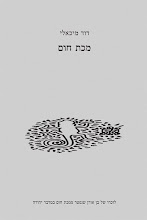
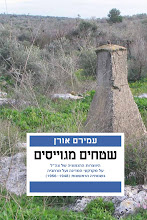
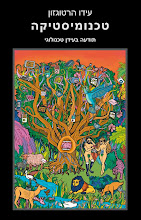
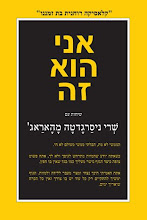
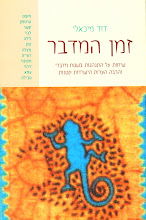
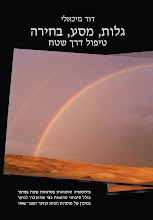
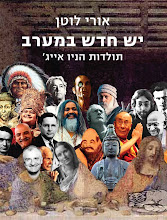
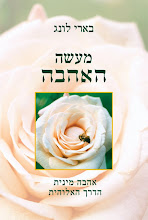
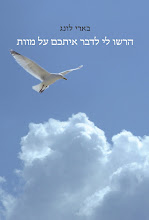


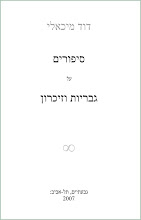
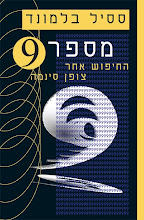
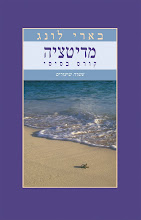
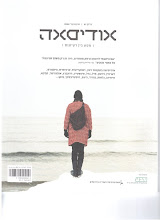

אין תגובות:
הוסף רשומת תגובה